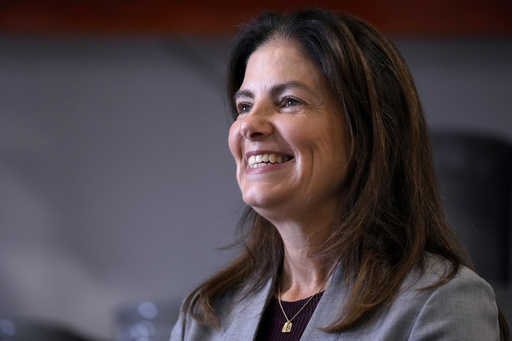
The recent election of Kelly Ayotte, a Republican, as the governor of New Hampshire signifies a historic shift, with a record-setting 13 women set to occupy the role of state chief executive next year. This surpasses the previous record of 12 female governors established after the elections of 2022.
Governors play a crucial role in American politics, influencing state policies, and leveraging their positions to pursue higher offices. According to Kelly Dittmar, the director of research at the Rutgers Center for American Women and Politics, having women in such leadership roles helps normalize the perception of female political leadership, particularly in executive positions where they serve as the sole decision-makers rather than just part of a team.
In light of current political dynamics, figures like Michigan’s Governor Gretchen Whitmer have emerged as possible candidates for presidential nominations, particularly following President Biden’s decision to withdraw from the race. Meanwhile, South Dakota’s Republican Governor Kristi Noem has been speculated as a potential choice for the vice presidential nomination under President-elect Donald Trump.
Ayotte triumphed over Democratic contender Joyce Craig, who previously served as the mayor of Manchester, New Hampshire’s largest city. Nevertheless, there remains a significant gap, as 18 states have yet to appoint a woman to the gubernatorial post. Dittmar has remarked on this underrepresentation, stating, “Thirteen out of 50 is still underrepresentation.”
The competition between two women for the governor position in New Hampshire was a significant indicator that a new record was on the horizon. New Hampshire has long been known for its history of electing women, including Ayotte’s previous tenure as a part of the nation’s first all-female congressional delegation. It was also a pioneering state to have female leadership across several top political roles simultaneously, including the governorship, Senate presidency, and House speakership. With Ayotte stepping into the role, she will be the third woman to hold the governorship in the state’s history.
Despite these milestones, as per Linda Fowler, an emeritus professor of government at Dartmouth College, Ayotte’s identity as a woman is not central to her political identity. Both Ayotte and Craig noted that their gender has not been a focal point on the campaign trail, although issues regarding reproductive rights were central themes. Craig criticized Ayotte’s stance on abortion, while both candidates brought attention to their personal experiences with miscarriages through their television ads. Ayotte has pledged to veto any legislation that further restricts abortion rights in New Hampshire, where the procedure is limited after 24 weeks.
With Ayotte’s inauguration, the count of Republican women serving as governors will increase to five, marking another new high, while the remaining eight governors will be Democrats. A notable factor in this election cycle was that New Hampshire’s gubernatorial race was one of the few competitive races among the 11 states holding elections.
Looking ahead to 2026, as 36 states prepare to elect governors, there is the potential for either progress or setbacks in women’s representation in political leadership. Although voters typically base their choices on party loyalty and ideological alignment rather than gender, Dittmar highlights that female candidates often face more intense scrutiny than their male counterparts, facing judgments on aspects like intelligence, appearance, and even aspects of their personal life.
The modest increase in female governors coincides with Vice President Kamala Harris’s unsuccessful bid to become the first female president. Dittmar posited that while Harris’s loss cannot simply be attributed to her gender or ethnicity, both factors certainly influenced the dynamics of her campaign, affecting perceptions from voters, media portrayal, and interactions with opponents. Dittmar also noted that executive roles, particularly the presidency, carry traditional masculine associations that women must challenge significantly.
Experts assert that women face harsher barriers in executive elections, such as those for governorships and the presidency, compared to their advancements in state legislatures where women are increasingly attaining leadership roles including committee chairs.
Erin Vilardi, CEO of Vote Run Lead, a group advocating for female candidates in state legislatures, emphasized that while sexism, racism, and misogyny may not singularly dictate voter behavior, they undeniably influence perceptions of leadership, deeply ingrained in cultural views of who qualifies as a leader.
